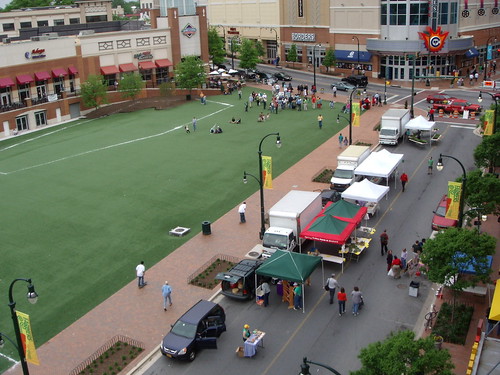 Ellsworth Drive on a summer night.
Ellsworth Drive on a summer night.Yesterday's Silver Spring Urban District Advisory Board meeting suggests that local residents are willing to come together after a concert two weeks ago erupted in violence in arrests. But with "the Turf" now a construction site for the Civic Building and Veterans’ Plaza – set to open next spring - Downtown's largest and most popular open space will be gone this summer, creating an even bigger challenge for dealing with rowdy young people on Ellsworth Drive.
“This summer’s going to be tougher than ever because there’s no turf,” says Richard Jaeggi, who attended the meeting, in a phone interview with JUTP. “It’ll be more congested than before.”
Jaeggi is the director of the Gandhi Brigade, who with Mixed Unity organized the “Stop the Violence” concert March 7. He sees “different sides and different concerns” among the many people who live, play and work in Downtown Silver Spring. “The tension between safety and inclusiveness is a real one, and I don’t see that as a matter of sides,” he says. “I feel pretty deeply that with work we can find some solutions that’s both safe and inclusive.”
Brent Gilroy, who’s lived in Seven Oaks for twenty-four years and also attended the meeting, argues that the solution is to “run the bad players out of town,” but is aware that this may not pan out. “It's clear that terms like ‘massive police presence’ and ‘get tough’ and labels such as ‘thugs’ are upsetting the people working with Silver Spring's youth -- the people who will have to have a say in the solution to the things bothering some of us,” he wrote in a letter to the SOECA listserv.
He laments that there was “no discussion of the larger issue that some of us have talked about -- the perceived rowdiness on downtown streets,” an issue which has appeared frequently on local blogs and listservs for over two years.
Jaeggi says many of the behavioral issues stem from a lack of things for young people to do in Silver Spring. “They need a place downtown and it’s a damn shame that the one place that is the public space, the Civic Building, is built ten years after the beginning of the project,” he says.
so much more AFTER THE JUMP . . .
 The loss of "the Turf" leaves one fewer space for Downtown Silver Spring visitors to go.
The loss of "the Turf" leaves one fewer space for Downtown Silver Spring visitors to go.It’s important, Jaeggi says, for frustrated residents to reach out to the young people who frequent Downtown Silver Spring – but also for young people to understand that their behavior isn’t always appropriate. “There are young people who, you know, act a fool and cut up, but most of them don’t mean any harm at all. But for some people, it’s really threatening,” he says. “It’s really good for those who are threatened by youth – especially minority youth – to rub shoulders with them and realize ‘they’re just like my kids.’”
Despite the negative attention that the “Stop the Violence” concert has brought the group, Mixed Unity has a lot of potential, says Jaeggi. “This is a really powerful group of young people, very diverse, not just ethnically and culturally but in economic status,” he says. “I see this as a real fantastic opportunity for Montgomery County to reach out to these youth and make good things happen. It’s a rare resource to have organized youth who want to make good things happen and be part of the solution.”
And, as the concert’s organizers have stressed in the past, this won’t be the last “Stop the Violence” event you’ll see in Downtown Silver Spring. “We’re about nothing if not non-violence . . . but good intentions are not enough,” says Jaeggi. “I also believe in making mistakes and not giving up and getting it right the second time, or the third time, or the fourth time.”
The blame can be laid at everyone's feet, suggests Gilroy. "There was general agreement that we're all falling down on the job, and need to do more," he says. "I think the non-profits will look to the business community to do more to sponsor activities and make the kids feel included in our downtown."
Gilroy notes that the Peterson Companies is making strides to ensure that future concerts are better planned. Mixed Unity and the Gandhi Brigade will become part of a "planning group" that'll work with Peterson to hold more events with the condition that they end at 8:30pm. Both Jennifer Nettles from the Peterson Companies and Richard Jaeggi from the Gandhi Brigade will be at the Seven Oaks-Evanswood Civic Association's next meeting in April to talk about how the community should move forward.
Both sides agree that the time for fighting is over. “It's clear that a continuation of the kind of discussion we've all engaged in the past two weeks will . . . get all of us labeled as insensitive, or far worse,” says Gilroy. "If we're willing to . . . set aside our emotions, drop the heated words and understand that the kids acting this way are doing so for reasons that are largely the community's responsibility -- I think they will work with us."
Jaeggi is confident that the community’s hardship will result in a compromise. “A lot of the anger and frustration was existing before . . . and this was a catalyst,” says Jaeggi. “I’m really hopeful and optimistic, even though it’s been a painful thing for all of us. It’ll get us off the fence and start coming up with some solutions.”

3 comments:
The problem -- or rather, the only problem -- isn't that these kids are bored. One big problem is that they think it is perfectly okay to spew profanities no matter who is around. Rubbing shoulders with them won't change that. Giving them more things to do won't change that. Getting older will hopefully change that for individuals, but younger kids will fill in the gap.
I'm not sure how to change this except maybe -- maybe -- nuisance laws. Yes, we can put up with it, but why should we? My wife and I have a good solution for minimizing our exposure to this unpleasant scene: we go elsewhere whenever possible. But then, so do our dollars, and I'm sure we're not alone in that regard.
[...] says Gilroy. "If we're willing to . . . set aside our emotions, drop the heated words and understand that the kids acting this way are doing so for reasons that are largely the community's responsibility -- I think they will work with us."
Ah, not to be overly divisive here, but I think the subject has come up numerous times that the reasons certain kids/young-adults are acting a certain way may in fact be the community's responsibility... but the responsible community isn't downtown Silver Spring, but maybe some communities in the District or over in Prince George's County.
If the real problem is kids from elsewhere trying to horn in on the scene and cause trouble there -- because they don't have to live with the results afterwards but everyone else does -- then cracking down on the actual local kids, or even cozying up to them and engaging in heavy mentoring and "setting a good example, simply will not work.
It's definitely a good idea to both be ready with more crowd control and better event planning. And the idea of a "youth anti-violence movement" is certainly a good one. It's an even better idea to have more adults on the scene setting good examples and mentoring the kids on the scene. That will benefit everyone on the scene, both those who live there and those who trying to run a business there.
But the issue of "but what about troublemakers from afar" simply isn't going to be settled by locals mentoring locals or having an adult presence of folks who can tell acting-up kids "you know I'll be talking to your mom about this".
So, what planns has anyone got for dealing with the sort of element like the Bloods that came in form PG to Wheaton Plaza "lookin' to shoot someone" as we saw a few months ago? Because you can tell when a local is headed for trouble, but stuff that comes from way outside of the range of your radar is something you're not going to see coming. And how do you deal with that,
To add to what Thomas said, if Mom of some foul-mouthed punk does happen to be nearby and you talk to her about it, chances are high that you'll hear exactly where the kid learned to speak like that.
The answer is cultural, and like Thomas said, being a good person to the good kids means that you're helping the good kids; the antisocial creeps could not care less about you and your good intentions.
Post a Comment